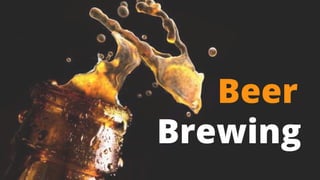
Beer Brewing .pdf
- 1. Brewing Beer
- 2. Beer is an alcoholic beverage produced by extracting raw materials with water, boiling (usually with hops), and fermenting. In some countries, beer is defined by law—as in Germany, where the standard ingredients, besides water, are malt (kiln-dried germinated barley), hops, and yeast. What is beer? History of brewing Beer doesn’t just taste great; it has a fascinating history too. Brewing, in some form or other, has been around for thousands of years, with evidence of recipes dating back nearly as far as 2000 BC. The Beer quickly became the most popular alcoholic beverage in the world, with currently around 2 billion hectolitres being brewed worldwide, per year.
- 3. These are processed grains which have a naturally high starch content. Brewers use the starch for the formation of sugar and the eventual production of alcohol. Malted barley, or malt, is the brewer’s preferred grain for making beer though many other types of malted and non-malted grains are commonly used. MALT Ingredients HOPS Hops are what makes beer beer. They provide a flavour and aroma and help keep the beer fresher for longer. In most brewing situations, some number of hops are boiled in wort for 1-1.5 hours, and it is during this time that the ‘alpha acids’ provide the main bitter and preservative element of beer. YEAST Yeast is the most important element of brewing. It’s what converts the sugar to alcohol. Most yeast manufacturers indicate the ‘style’ of beer the yeast is most suited to, in order to help you in the beginning. WATER Pure, clean water is essential as it makes up more than 85% of your beer. The better that quality of the water, the better the beer. With the correct knowledge and adjustments, water can be the difference in turning a great beer into an amazing beer!
- 4. A brew kettle is used to boil wort during the wort-creation process. We recommend choosing a high-quality product here, especially one made from 304 stainless steel. The resistance to corrosion and heat damage which will prove its value over time and last for years. BREW KETTLE B R E W I N G E Q U I P M E N T MASH TUN If you are proceeding to all-grain brewing from extract, then you may also need to get your hands on a mash tun for the additional mashing process. While many systems combine both the kettle and the mash tun into a single piece, it is possible to use a separate mash tun from your kettle. FERMENTER A critical piece of equipment for any brewer. A fermenter is where the sugary solution made from steeping malted grains in warm water (the wort) takes on its alcoholic content.
- 5. There are only 3 rules in brewing. Sanitise, sanitise and sanitise! It may not be the most enjoyable part of brewing but it’s the most important. The last thing a brewer wants is a batch of beer ruined by avoidable contamination. SANITASING Brewing Process MASHING Mashing refers to the process where enzymes in the grain convert complex starches into sugars which can be turned into alcohol. Using a ‘Mash Tun’ the grains are steeped in warm water usually between 65°C – 68°C (149°F – 154°F) for an hour. BOILING Boiling concentrates, sanitises and contributes significantly to the final wort composition, which in turn controls many of the factors in flavour, body and palate fullness of the final beer. It‘s also where we add delicious hops. FERMENTATION To begin the fermentation process, you transfer cooled wort to a fermenting vessel and add the yeast. During this process, the yeast converts the sugar in the wort to alcohol and CO2. Important flavour compounds are also being created at this stage.
- 6. KEGGLING & BOTTLING Bottling beer Bottling is generally the cheaper and simple option for those starting out. It also makes it easier to turn up to a BBQ with your latest homebrew in hand. Just like everything in brewing, bottles need to be clean and sanitised. Fortunately, this can be as easy as running them through a hot wash in a clean dishwasher. Bottles can be glass or plastic and can be reused to make the hobby even more sustainable. Kegging Kegging beer is a more consistent alternative to bottling – it also takes less time. Kegs can be hooked up to a tap and served just like your local brewery. It’s more of an investment but as well as ease of process, it comes with the ultimate bragging rights. Picture your next hangout, sharing your latest brew from your home bar set up. If you think kegging is the way to package up your brew, you can find some great tips in our guide to kegging.